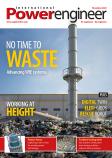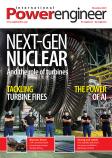Adriano Lanzilotto explains why power generators must adopt new approaches to mitigating operational risks
Like many aspects of modern society, the power generation industry is evolving more rapidly than ever. Factors such as climate change, the progressive depletion and increasing cost of fossil fuels, tight industry margins, the push towards greener energy, the demographic pressure in many areas of the world and the energy needs of developing countries, mean that power companies constantly need to adapt and keep pace with fast change. The adoption of new technologies, the investments in new plants and more efficient generating equipment and the management of existing, ageing plants through different operating models are all part of this scenario and all involve a degree of risk.
Power generators must develop new expertise to identify, evaluate and mitigate these risks if they wish to remain in business. Failure to do so would expose them to potential loss of operational capacity and/or efficiency and would ultimately affect their profit, balance sheet and reputation. Amidst these changes, the fact remains that the majority of losses, whether caused by equipment failures, natural catastrophes or human errors, are preventable.
Power generation is one of the most challenging occupancies that FM Global insures, and its clients range from large public utilities to small alternative energy producers. FM Global works in partnership with them to manage changes such as the ones listed below.
Deregulation
Deregulation was introduced to the UK power market in 1990. It brought about risk management challenges with increased competition from privatisation and greater commercial pressure on organisations. As a result, many generators have changed the way they operate. Cyclical operation, driven by peaks in spot electricity prices, is often more convenient than base-load operation. This can result in regimes that are aggressive on equipment. Many organisations are now ‘two shifting’, which is the process of shutting-down a power plant during periods of low demand and re-starting it when demand increases. This causes headaches for plant owners and operators, whose equipment was designed for base-load generation. Plant ‘cycling’, i.e. repeatedly shutting-down and starting-up a plant, can lead to fatigue, which is characterised by mechanical failures occurring at much lower levels of stress. FM Global’s research suggests that 70% of industry losses stem from equipment breakdown, including mechanical and electrical failure.
Increased operation has meant that power generation companies are adopting more efficient approaches to maintenance such as condition-based regimes, as opposed to time-based approaches. A condition-based approach uses monitoring equipment that collects real-time data to assess whether certain components have become particularly worn or need replacing. Although this process can save costs and reduce operational downtime for maintenance and repairs, it will only be both cost-effective and efficient at avoiding unplanned outages if business continuity best practices are engrained in everyday operations.
One challenge companies face, particularly in developed countries, is the fact that many plants have been built in the last quarter of last century and are now approaching the end of their lifecycle. This generates the need to either re-invest in modern equipment or to extend the life of existing assets, whilst also maintaining the highest levels of safety and asset security.
Some companies cope with rising costs of repair and replacement by sourcing new parts more cheaply from markets such as China, rather than the original equipment manufacturers (OEMs). In some cases this translates into uncertainty in the testing and approval process, in the quality control programmes and the quality and reliability of the materials used. Although apparently more convenient in the short run, procuring replacement parts from alternative, non-OEMs sources increases the risk of operational failure.
New technologies
Since the introduction of carbon pricing and trading schemes, the power generation industry has been put under increasing pressure to diversify its portfolio and reduce reliance on carbon intensive fossil fuels. Likewise, many companies are investing in renewables in order to lower emissions and build reputations for sustainability.
Renewable energy often presents unique sets of risk management challenges. For instance, within the waste-to-energy industry, the combination of power generation and waste management brings together a variety of different automated and complex operations. At its very heart, the introduction of power generating equipment brings elements that were not common to the traditional waste management industry. These power-generating elements have offered a new and compelling revenue stream, but also a challenge to ensure they are free of interruptions and breakdown.
FM Global’s client loss history shows human behaviour is a key factor driving losses in the power industry: operator errors, wrong decisions, inadequate training and procedures, poor management of change and miscommunication can negate physical equipment safeguards or protection devices, causing large losses. The economic environment means companies are being forced to downsize. This not only stretches resources, dilutes expertise and increases workload, but also leads to more outsourcing. External contractors and suppliers may not have the same attitude, culture or commitment when it comes to loss prevention.
Ignoring the human element can have dire consequences. Organisations must embed loss prevention procedures and staff training into their corporate strategy, by taking a long-term approach to protect business continuity.
Power disruption comes in many forms, not always predictable. Companies generate revenue in complex ways and standard insurance coverages such as the Gross Profit Business Interruption cover are often too generic or not applicable to a power business as they are to a traditional manufacturing process. When companies make a claim, they may not be compensated correctly because the complexities of the business were unknown by the insurer. Many companies are also unaware that insurance often covers only the residual cash value of old equipment, meaning that if a loss occurs, they will not be covered for new, modern equipment. One step organisations can take is to ensure they have tailored insurance coverage that addresses their unique business models.
The role of risk management
A wide, holistic approach to risk management addressing all the abovementioned risks and many more, would help prevent unplanned outages and reduce the financial impact should one occur. A risk improvement programme tailored to the specific needs, features and resources of each individual company or plant, combined with a comprehensive insurance cover, would create a powerful framework to improve the company’s resilience to loss. A typical power generation risk management programme would include things such as emergency response procedures for potentially dangerous situations, calling for quick action when, for example, equipment shows signs of stress. Training operators to recognise dangerous situations and implement correct procedures would also feature, as would ensuring there is a well-equipped fires response team. Strict contractor management and ignition source control procedures is next on the list, followed by close liaison with OEMs on maintenance regimes for critical equipment. Specific training and succession planning programmes aimed at retaining the highly specialised knowledge needed to run such plants is also a key part of the approach. Adequate spare parts and operational redundancy policies for key equipment is critical. Finally, active and passive fire protection systems are a must-have.
In modern society, the continuous, reliable and sustainable availability of energy is at the core of everything we do, as it supports the general economy, individual businesses and our everyday lives. When a power generation plant is unable to operate due to a loss, the fundamental reputation that that company worked so hard to create is at stake, as is its share value. To keep this value secure, it's important to do the right things to make sure you don't get knocked down in the first place.
Adriano Lanzilotto is assistant client service manager, Northern Europe Operations with FM Global.
Real-world case study
Lakeside Energy from Waste (EfW) has been in reliable operation for the past five years. During this time, Lakeside has re-invested back into the business to ensure its plant is robust and protected, writes Danny Coulston.
One major focus has been loss prevention. Working closely with FM Global, the aim has been to ensure that equipment is resilient and that processes are robust. Steps taken to ensure these improvements include additional fire deluge systems for the gas oil storage area; spray systems in the stores and office blocks; transformer deluge; improvements to hot work procedures and enhanced maintenance practices.
Active risk management and plant improvements to mitigate potential losses have helped to ensure Lakeside remains one of the best performing plants in the UK, identifying it as a benchmark site for the industry. Additionally, this has developed stability in the operation of the plant, which has given suppliers the confidence that working with Lakeside EfW will ensure that they can meet their waste management targets.
Danny Coulston is Director of Operations, Lakeside FfW.

















